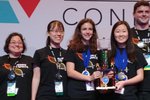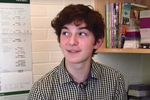Student Teams Selected as Finalists for International Space Station STEM Competition
Winning Genes in Space experiment to be performed aboard ISS
May 16, 2017, Boston, Massachusetts – The Genes in Space™ science contest announced five finalists in the annual U.S. competition. 375 teams from grades seven through 12 proposed DNA analysis experiments to address real-life space exploration challenges. The winning experiment will be performed aboard the International Space Station (ISS).
The five finalist teams will be mentored by scientists at Harvard University and MIT. The teams will present their proposals to a panel of scientists and educators at the 2017 ISS Research and Development Conference in Washington, D.C., July 17-20. The winning team will be announced at the conclusion of the conference and will participate in a space biology workshop to prepare their investigation. The team will watch their experiment launch to space.
Genes in Space™ promotes youth scientific engagement and DNA research in space. All proposals use miniPCR™ technology aboard the ISS. PCR is a method for making copies of a particular DNA sequence. The competition is a partnership between miniPCR, Math for America, CASIS, New England Biolabs®, and Boeing and is sponsored by FedEx.
The first Genes in Space™ experiment by high-school student Anna-Sophia Boguraev was performed aboard the ISS in April of 2016 and was the first PCR experiment ever conducted in space. The second winner, Julian Rubinfien, is currently awaiting the return of his samples from space for analysis.
The 2017 Finalists:
Sophia Chen (14) from Lakeside School, Washington, aims to measure cancer-inducing genomic instability in astronauts.
Elizabeth Reizis (14) from Stuyvesant High School, New York, wants to assess the effects of microgravity on the immune system.
Maxwell Allison (16) and Elena Li (16) from The Bronx High School of Science, New York, plan to investigate bone loss in microgravity.
Divya Aggarwal (15) and Priyanka Pulvender (15) from Troy High School, Michigan, aim to study heart remodeling in astronauts.
Tanmay Srinivasan (15) and Ayush Krishnamoorti (14) from The Kinkaid School, Texas, hope to uncover the genetic basis of hypoxia during long space missions.
For more information about the Genes in SpaceTM competition, Finalists, and other awardees, visit: www.genesinspace.org.
Media contacts:
miniPCR: Emily Gleason, genesinspace@minipcr.com, 781-990-8727
Math for America: Scott Woodson, woodson@mathforamerica.org, 646-437-0944
Boeing: Kelly Kaplan, kelly.g.kaplan@boeing.com, 281-226-4367
CASIS: Patrick O’Neill, poneill@iss-casis.org, 321-480-1054
New England Biolabs: Deana Martin, martin@neb.com, 978-380-7464


